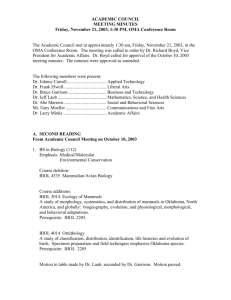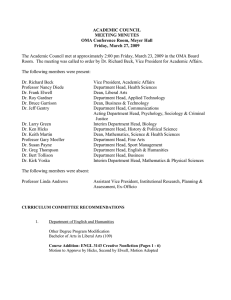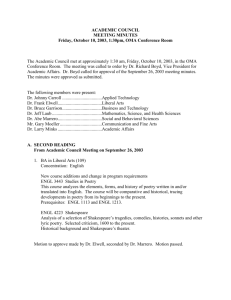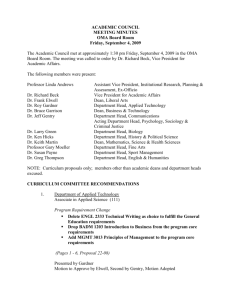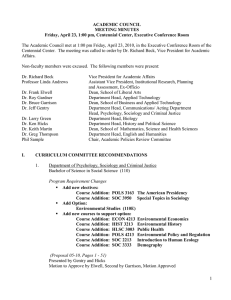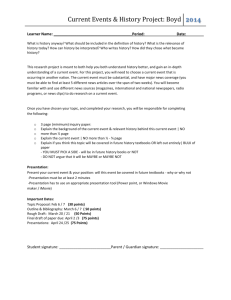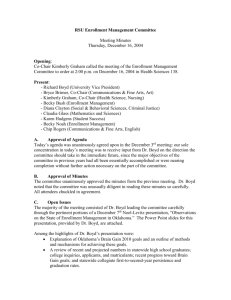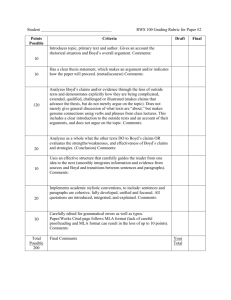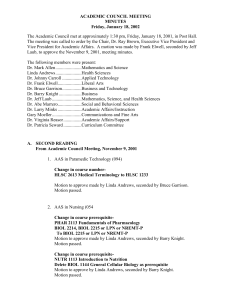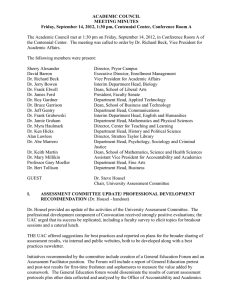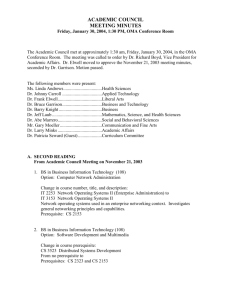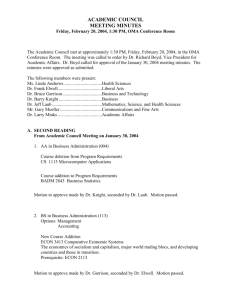ACADEMIC COUNCIL
advertisement
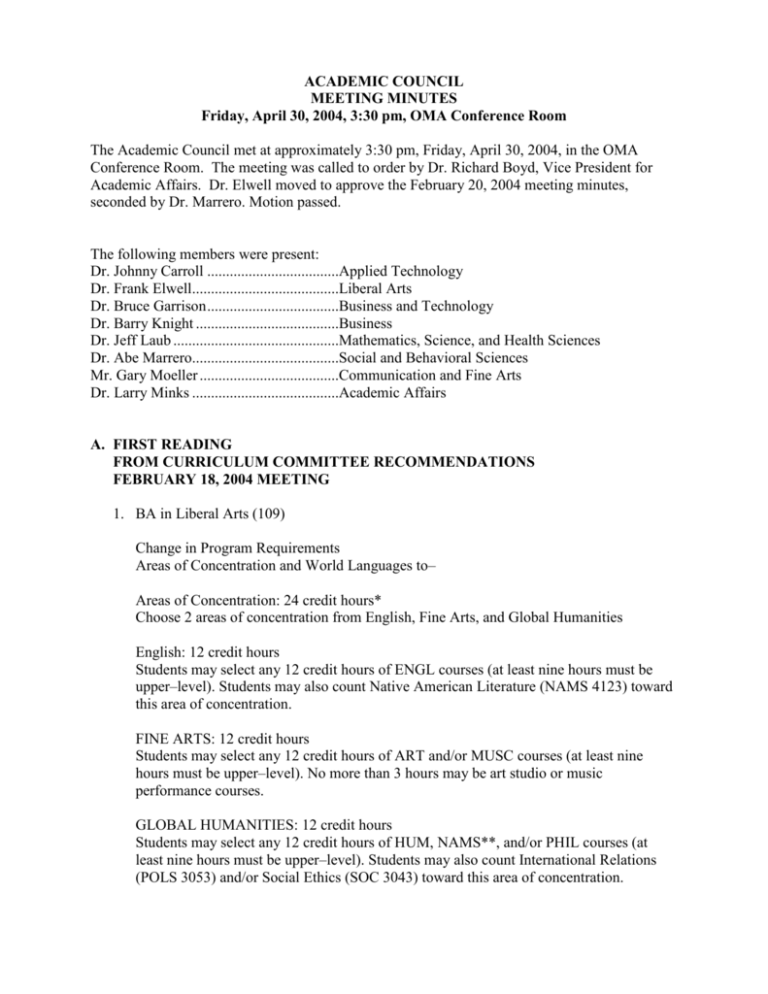
ACADEMIC COUNCIL MEETING MINUTES Friday, April 30, 2004, 3:30 pm, OMA Conference Room The Academic Council met at approximately 3:30 pm, Friday, April 30, 2004, in the OMA Conference Room. The meeting was called to order by Dr. Richard Boyd, Vice President for Academic Affairs. Dr. Elwell moved to approve the February 20, 2004 meeting minutes, seconded by Dr. Marrero. Motion passed. The following members were present: Dr. Johnny Carroll ...................................Applied Technology Dr. Frank Elwell.......................................Liberal Arts Dr. Bruce Garrison ...................................Business and Technology Dr. Barry Knight ......................................Business Dr. Jeff Laub ............................................Mathematics, Science, and Health Sciences Dr. Abe Marrero.......................................Social and Behavioral Sciences Mr. Gary Moeller .....................................Communication and Fine Arts Dr. Larry Minks .......................................Academic Affairs A. FIRST READING FROM CURRICULUM COMMITTEE RECOMMENDATIONS FEBRUARY 18, 2004 MEETING 1. BA in Liberal Arts (109) Change in Program Requirements Areas of Concentration and World Languages to– Areas of Concentration: 24 credit hours* Choose 2 areas of concentration from English, Fine Arts, and Global Humanities English: 12 credit hours Students may select any 12 credit hours of ENGL courses (at least nine hours must be upper–level). Students may also count Native American Literature (NAMS 4123) toward this area of concentration. FINE ARTS: 12 credit hours Students may select any 12 credit hours of ART and/or MUSC courses (at least nine hours must be upper–level). No more than 3 hours may be art studio or music performance courses. GLOBAL HUMANITIES: 12 credit hours Students may select any 12 credit hours of HUM, NAMS**, and/or PHIL courses (at least nine hours must be upper–level). Students may also count International Relations (POLS 3053) and/or Social Ethics (SOC 3043) toward this area of concentration. Academic Council Meeting Minutes April 30, 2004 Page 2 LANGUAGE: 3 credit hours* All students must complete a second level or above non–English language course. *Courses counted toward General Education requirements may not be counted toward BALA degree program requirements. **Students may not count Cherokee language courses (NAMS 2503 and 2623) toward the Global Humanities area of concentration. 2. BS in Social Science (110) Options: History and Political Science Emphasis Psychology and Sociology Emphasis Changes in Program Requirements Major Emphases changed to the following: Major Emphasis (21 credit hours) History and Political Science Emphasis Students must take 21 hours of POLS or HIST classes of which at least 6 hours must be from each discipline and 15 hours must be upper–division. Major Emphasis (21 credit hours) Psychology and Sociology Emphasis Students must take 21 hours of PSY or SOC classes of which at least 6 hours must be from each discipline and 15 hours must be upper–division. Discussion: – Breadth and depth of study and exit level program assessment are major issues. – Mastery of content discipline important in preparation for graduate school. – Departure from original purposes and intent of degrees. – Possibility of enlarging cores in future. – Needs much more discussion, assessment, feedback from graduates, etc. – Would the statement in each concentration, or emphasis, “select from following courses”, or “select courses with the approval of Dean or Dept. Head”, effect the same outcome? B. FIRST READING FACULTY DEVELOPMENT COMMITTEE RECOMMENDATION SEPTEMBER 8, 2003 MEETING Faculty Mentoring Program Proposal Discussion: – The proposal should be specific to RSU and more concise. Academic Council Meeting Minutes April 30, 2004 Page 3 – – – – – – – – – – – Need to show more formalized arrangement of who does what and when. Mentoring could be used as faculty university service. Proposal should be discussed with department faculty before next meeting. Myra will conduct training for mentors. Several items listed don’t apply to RSU. Training and workshops are needed on advising and other related issues. Deans and Department Heads should make sure new faculty are mentored. Center for Teaching and Learning should address and target issues as they come up. Mentoring could be placed in faculty member’s development plan. Proposal could be used as foundation guidelines for a good mentor. Dr. Boyd will meet with Myra Haulmark and Sally Emmons to clean up, revise, and resubmit. A. FIRST READING DISTANCE EDUCATION COMMITTEE RECOMMENDATION APRIL 5, 2004 MEETING Amended version of recommendation from conference committee held on March 11, 2004 as follows: Courses taught via different modes of delivery shall be considered individual courses for the purposes of determining faculty load and/or credit. Exceptions shall be determined by the Dean and Department Head, in concert with the faculty member involved. Motion to waive second reading and approve made by Dr. Garrison, seconded by Dr. Laub. Motion approved. Next meeting tentatively set for Friday, May 21, at 1:30 pm. DISTRIBUTION: Linda Andrews, Dr. Richard Boyd, Dr. Johnny Carroll, Dr. Frank Elwell, Dr. Bruce Garrison, Dr. Barry Knight, Dr. Jeff Laub, Dr. Abe Marrero, Gary Moeller, Dr. Larry Minks, Anita Schell (Academic Support Coordinator), and Dr. Patricia Seward (Chair, Curriculum Committee).
